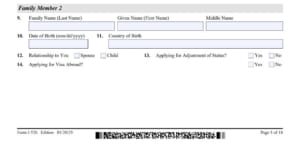 Enterline and Partners recently represented a newlywed couple living in the Philippines in an expedited I-130 Petition for Alien Relative at the U.S. Embassy in Manila. The couple, a U.S. citizen and a Philippines citizen, were married in the United States and living in Manila. The expedited filing, which was based on the U.S. citizen spouse’s immediate relocation to the U.S. for employment, was one of the first Direct Consular Filing (“DCF”) cases since the United States Citizenship and Immigration Services (“USCIS”) Manila Field Office ceased operations last year. Prior to DCF in Manila, expedited I-130’s were usually processed through the local overseas USCIS Field Office having jurisdiction of that Consulate or Embassy.
Enterline and Partners recently represented a newlywed couple living in the Philippines in an expedited I-130 Petition for Alien Relative at the U.S. Embassy in Manila. The couple, a U.S. citizen and a Philippines citizen, were married in the United States and living in Manila. The expedited filing, which was based on the U.S. citizen spouse’s immediate relocation to the U.S. for employment, was one of the first Direct Consular Filing (“DCF”) cases since the United States Citizenship and Immigration Services (“USCIS”) Manila Field Office ceased operations last year. Prior to DCF in Manila, expedited I-130’s were usually processed through the local overseas USCIS Field Office having jurisdiction of that Consulate or Embassy.
While the couple received their I-130 DCF approval the day that their case was submitted, a medical delay coupled with the COVID-19 pandemic resulted in the beneficiary being unable to undergo the interview. Faced with the medical evaluation expiring, Enterline and Partners feverishly advocated for its client by continuously reaching out to the Immigrant Visa Unit and the Consul General’s office to request an emergency appointment. The Embassy granted our request and the beneficiary’s CR-1 immigrant visa was issued.
For clients living in the Philippines, Vietnam, Taiwan as well as across Asia who have an immediate need to return to the United States such as for a job offer, a family-related medical emergency or other short-notice or emergent circumstances, our U.S. immigration lawyers are experienced in obtaining expedited I-130 processing without having to file an I-130 Petition with the USCIS in the United States and reducing the overall processing time from 12 to 18 months to 4 to 6 weeks in most cases.
For more information, contact us at info@enterlinepartners.com and speak with one of our U.S. immigration lawyers in Ho Chi Minh City, Manila and Taipei.
ENTERLINE & PARTNERS CONSULTING
Ho Chi Minh City, Vietnam Office
Suite 601, 6th Floor
Saigon Tower
29 Le Duan Street
Ben Nghe Ward, District 1
Ho Chi Minh City, Vietnam
Tel: +84 933 301 488
Email: info@enterlinepartners.com
Facebook: Enterline & Partners – Dịch vụ Thị thực và Định cư Hoa Kỳ
Website: http://enterlinepartners.com
Manila, Philippines Office
Unit 2507 Cityland 10 Tower 1
156 H.V. Dela Costa Street
Makati City, Philippines 1209
Tel: +632 5310 1491
Email: info@enterlinepartners.com
Facebook: Enterline and Partners Philippines
Website: https://enterlinepartners.com/language/en/welcome/




